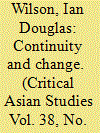| Srl | Item |
| 1 |
ID:
072690


|
|
|
|
|
| Publication |
2006.
|
| Summary/Abstract |
This article examines the changing nature of organized violence in post-New Order Indonesia. The New Order regime, which ended with the overthrow of Suharto in 1998, employed violence as a central strategy for maintaining political control, both through the state apparatus and via state proxies: criminal and paramilitary groups acting in the state's behalf. In effect, violence and criminality were normalized as state practice. The collapse of the New Order and the resulting fragmentation of its patronage networks have prompted a decline in state-sponsored violence, but at the same time the number of non-state groups employing violence and intimidation as a political, social, and economic strategy has increased. This article looks at this phenomenon of the "democratization" and privatization of organized violence in post-New Order Indonesia via detailed case studies of a number of paramilitary and vigilante groups. While operating in a manner similar to organized crime gangs, each group articulates an ideology that legitimizes the use of force via appeals to ethnicity, class, and religious affiliation. Violence is also justified as an act of necessary rectification rather than direct opposition, in a situation where the state is considered to have failed in providing fundamentals such as security, justice, and employment.
|
|
|
|
|
|
|
|
|
|
|
|
|
|
|
|
| 2 |
ID:
078819


|
|
|
|
|
| Publication |
2007.
|
| Summary/Abstract |
Ethnic gang violence is often depicted as a clash between criminals pursuing instrumental advantage or as one between ideological fanatics pursuing collective nationalist, ethnolinguistic, or ethnoreligious rights. However, there is an apparent tension between the conceptualization of such violence as the rational self-interest of deprived individuals, and as the irrational fanaticism of anomic communities. The examination of one particular ethnic gang, the Betawi Brotherhood Forum which operates in Jakarta, Indonesia, indicates how both dimensions of violence coexist and interweave. The apparent analytical tension between individualistic pragmatism and collectivist moral absolutism is resolved by showing how the gang responds to their disillusionment with the state by constructing for themselves a "state proxy" role. This response is portrayed as based upon "ressentiment" - the "faulty rationality" which marginalized individuals adopt so as to translate their clashes of material self-interests into the moral conflict between stereotyped communities - the virtuous ethnic Us against the demonized ethnic Other
|
|
|
|
|
|
|
|
|
|
|
|
|
|
|
|